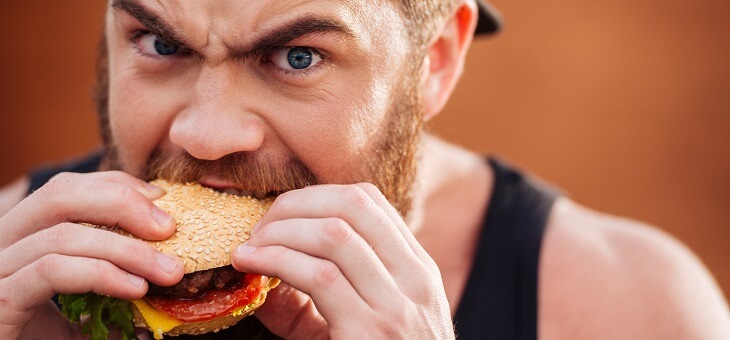You may have seen television ads that espouse the value of having a snack as a way of calming down. Rampant monsters become cute little puppies once they’ve devoured a Kit Kat or whatever snack is being promoted.
Devouring a bar of chocolate works because once you’ve eaten it, you’re no longer ‘hangry’. But is being ‘hangry’ really a ‘thing’? Or just a marketing portmanteau (hungry + angry) created by sweets manufacturers to improve their bottom line?
A new study suggests the concept is real. Researchers from the department of psychology and psychodynamics at Karl Landsteiner University of Health Sciences in Austria have found that “the experience of being hangry is real, insofar as hunger was associated with greater anger and irritability, and lower pleasure, in our sample over a period of three weeks.”
Read: Hunger on the rise for pensioners
Participants from Central Europe completed a 21-day experience sampling phase in which they reported their hunger, anger, irritability, pleasure and arousal at five points each day. They reported that their hunger was associated with greater feelings of anger and irritability, and with lower pleasure.
Each participant was asked to record their feelings of hunger, irritability and anger on a scale of 0 to 10 at the daily timepoints, answering via questions in the form: How hungry are you at the moment [0 = not hungry at all, 100 = very hungry]?
It should be noted that the sample size in this study was only 64, but all 64 participants provided answers for each of the five time-points on all 21 days. (The original sample size was larger, but the researchers used the results of only those who completed the surveys in full.) As a result, a total of 9142 responses were recorded, a statistically relevant number.
Read: A mind game to curb hunger
The concept of ‘hanger’ makes sense at least on one level, when one considers that our brains use as much as 30 per cent of the calories we consume. Our brains need food.
This holds true regardless of gender and other factors. The Karl Landsteiner University of Health Sciences researchers found their findings “remained significant after accounting for participant sex, age, body mass index, dietary behaviours.”
So what exactly happens to your brain when you’re hungry? According to Dr Zhi Yi Ong, a senior lecturer in biomedical science at UNSW, the answer lies in our brain’s neurons.
“There’s a population of neurons in the brain that are hunger neurons, activated by hunger,” she says.
Read: How the Mediterranean diet can save your health and the planet
Dr Ong’s comments support those made by Sophie Medlin, lecturer in nutrition and dietetics from Kings College London, on BBC radio.
“Neuropeptides, secreted by neurons, control the chemicals in our brain. The ones that trigger for hunger are the same ones that trigger for anger and rage and impulsive type behaviours. So that’s why you get that sort of same response,” she says. “When our blood sugars drop, cortisol and adrenaline rise up in our bodies – our fight or flight hormones.”
Someone in mainstream (or perhaps social) media at one point decided to distil the entire concept into a portmanteau, and the words ‘hanger’ and ‘hangry’ were born.
Now that you used a fair bit of brain energy digesting all of this information, you might like to head to the pantry and grab a snack. After all, we wouldn’t want you to get hangry.
Have you experienced being hangry? Or did you note it with your kids? Why not share your experiences in the comments section below?
If you enjoy our content, don’t keep it to yourself. Share our free eNews with your friends and encourage them to sign up.

